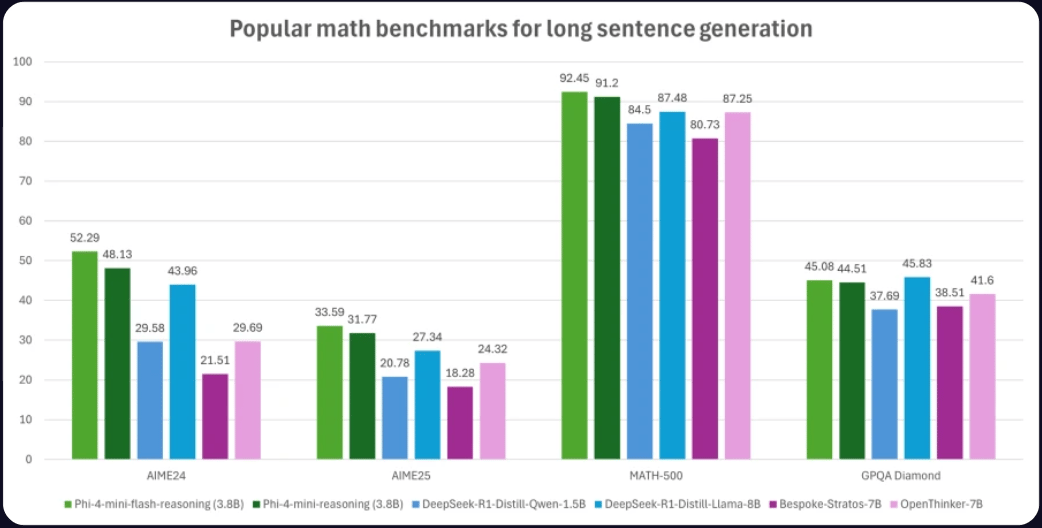- AI Report by Explainx
- Posts
- Microsoft’s Tiny, Ultra-Fast Reasoning AI Model🤖
Microsoft’s Tiny, Ultra-Fast Reasoning AI Model🤖
Microsoft launches Phi-4-mini-flash for mobile AI, Nvidia unveils export-safe Blackwell chip for China, and Meta acquires PlayAI to boost voice tech in AI characters and tools.
Welcome to your quick yet powerful download of the latest breakthroughs shaping the future of AI, chips, and voice tech. From lightning-fast reasoning on mobile to strategic hardware pivots and major acquisitions, this week’s developments highlight the accelerating pace of innovation across the industry.
🔹 Microsoft unveils Phi-4-mini-flash, a game-changing compact AI model built for mobile and edge devices—offering high reasoning performance with low latency and efficient memory usage.
🔹 Nvidia is making a strategic return to China with an export-compliant version of its Blackwell chip, balancing innovation with international regulation.
🔹 Meta continues its aggressive AI expansion by acquiring PlayAI, a voice technology startup poised to supercharge its AI characters and next-gen audio experiences.
Let’s dive into the details.
Phi-4-mini-flash: Lightning Logic for Mobile and Edge

Microsoft’s Phi-4-mini-flash-reasoning is a new addition to the Phi model family, purpose-built for scenarios where compute, memory, and latency are tightly constrained—such as edge devices, mobile applications, and real-time systems. This compact, open model features 3.8 billion parameters and is optimized for advanced math and logic reasoning, supporting a 64K token context length. Its standout innovation is the SambaY hybrid architecture, which integrates state space models (Mamba), sliding window attention, and a Gated Memory Unit (GMU) for efficient memory sharing between layers. This design enables up to 10 times higher throughput and 2–3 times lower latency than its predecessor, Phi-4-mini-reasoning, while maintaining strong reasoning performance. The model is especially well-suited for educational technology, adaptive learning platforms, on-device reasoning assistants, and interactive tutoring systems that require fast, scalable, and efficient logic inference. Benchmarks show Phi-4-mini-flash-reasoning outperforming larger models on structured reasoning tasks, and it is deployable on a single GPU, making it accessible for a wide range of use cases. Microsoft emphasizes responsible AI principles and robust safety post-training, including supervised fine-tuning, direct preference optimization, and reinforcement learning from human feedback, to ensure trustworthy deployment in real-world applications.
Nvidia to Launch Export-Compliant AI Chip for China in September

Nvidia will introduce a modified version of its Blackwell RTX Pro 6000 AI chip in China this September, specifically redesigned to comply with strict US export controls. The new chip omits high-bandwidth memory (HBM) and NVLink to meet regulatory requirements, aiming to restore Nvidia’s market presence after previous restrictions led to significant revenue losses. CEO Jensen Huang is set to visit Beijing to present the chip and engage with Chinese officials, underlining the company’s commitment to the Chinese market, which remains a major source of global AI hardware demand. While the chip’s capabilities are reduced compared to unrestricted models, early feedback from Chinese clients is positive, and Nvidia hopes the move will help regain market share and stabilize earnings despite ongoing geopolitical tensions.
Meta Acquires Voice AI Startup PlayAI to Accelerate AI Push

Meta has acquired PlayAI, a startup specializing in AI-generated, human-like voices, as part of its aggressive expansion in artificial intelligence. The entire PlayAI team will join Meta and report to Johan Schalkwyk, a recent hire who previously led speech research at Google and Sesame AI. PlayAI’s expertise in natural-sounding voice creation and programmable voice agents is expected to enhance Meta’s AI Characters, Meta AI, wearables, and audio content tools. This move follows Meta’s $14.3 billion acquisition of ScaleAI and the formation of Meta Superintelligence Labs, led by former ScaleAI CEO Alexandr Wang, as Meta intensifies efforts to build advanced, human-level AI systems and recruit top talent from rivals like OpenAI and Google.
Boost your earnings with Olly! Become an affiliate, share your unique link, and earn up to $125 on every successful sale. Start promoting Olly’s smart automation tools for LinkedIn, Instagram, X, and Facebook—help businesses grow while you get rewarded.

Top AI Products from this week
Kimi K2 - Kimi K2 by Moonshot AI is a new 1T parameter open-source MoE model (32B active). It delivers state-of-the-art performance on coding, reasoning, and agentic tasks. Base and Instruct models are now available.
Auralix - Meet Auralix - your AI study buddy that teaches and quizzes you out loud in real time. Dump your notes in, sit back, and let Auralix tutor you through the hard concepts and quiz you to make sure it sticks. Smarter learning, at your own pace.
Quoai - Quoting tech projects should take 3 minutes, not 3 hours. Create accurate, professional tech project quotes in seconds with Quoai. AI-powered team suggestions, cost and taxes calculations, and export-ready quotes templates — all in one place.
Brandthetics - Transform your boring raw talking videos into cinematic short-form content. Brandthetics adds captions, overlays, audio, effects, and more cool stuff that makes your video more aesthetic, engaging, and powerful. Easily customize everything to make it perfect.
KissPixel - Transform ideas into stunning visuals with our AI image generator. Create, enhance, and transform images with text-to-image, face swap, image extension, and upscaling tools. Free credits included, commercial license.
This week in AI
Biological AI Engine - Scientists created PROTEUS, an open-source system that accelerates evolution inside animal cells, enabling rapid design of new medicines and biosensors using directed evolution.
Warp 2.0 Launch - Warp 2.0 introduces the Agentic Development Environment, enabling multiple AI agents to write, debug, and deploy code in parallel, with boosted AI limits for paid users.
Inya.ai No-Code Launch - Gnani.ai launches Inya.ai, a no-code agentic AI platform for building multilingual voice and chat agents, offering $10,000 free credits to the first 1,000 sign-u.
Reachy Mini Robot Debuts - Hugging Face launches Reachy Mini, a $299 open-source desktop robot for AI learning and coding, supporting Python, sensors, and community sharing for students and enthusiasts.
Google’s AI Coding Boost - Google’s AI now assists with code completion, code review, and bug fixes, powering 50% of code characters and resolving 8% of review comments, driving major developer productivity gains.
Paper of The Day
System-of-systems modeling and optimization for intermodal mobility integrates advanced simulation and surrogate-based optimization methods to efficiently design and improve complex transportation networks. This approach enables the evaluation and optimization of new mobility solutions—such as eco-friendly aircraft and multimodal systems—by reducing computational costs and handling real-world constraints, ultimately supporting more sustainable, efficient, and resilient mobility systems.
📖 To read the whole paper visit here 👉 Paper Link